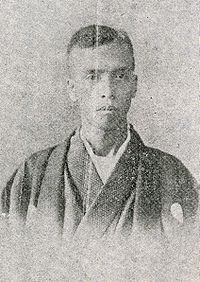
Saito Ryokuu
Encyclopedia

, better known by his pen name
Pen name
A pen name, nom de plume, or literary double, is a pseudonym adopted by an author. A pen name may be used to make the author's name more distinctive, to disguise his or her gender, to distance an author from some or all of his or her works, to protect the author from retribution for his or her...
, was a Japanese
Japanese people
The are an ethnic group originating in the Japanese archipelago and are the predominant ethnic group of Japan. Worldwide, approximately 130 million people are of Japanese descent; of these, approximately 127 million are residents of Japan. People of Japanese ancestry who live in other countries...
author
Author
An author is broadly defined as "the person who originates or gives existence to anything" and that authorship determines responsibility for what is created. Narrowly defined, an author is the originator of any written work.-Legal significance:...
and critic
Critic
A critic is anyone who expresses a value judgement. Informally, criticism is a common aspect of all human expression and need not necessarily imply skilled or accurate expressions of judgement. Critical judgements, good or bad, may be positive , negative , or balanced...
who lived during the Meiji Era.
Biography
In 1896, with and , Ryokuu started a literary journal, in which by was met with high critical acclaim. After Ichiyō died on November of this year, Ryokuu helped her mother and sister make a living although he was far from well-off. His literary friends include , and .In 1904, tuberculosis
Tuberculosis
Tuberculosis, MTB, or TB is a common, and in many cases lethal, infectious disease caused by various strains of mycobacteria, usually Mycobacterium tuberculosis. Tuberculosis usually attacks the lungs but can also affect other parts of the body...
, which had plagued Ryokuu for years worsened and no medical care helped him recuperate. On his deathbed, he referred Ichiyō's diaries which he had hoped to publish to Kochō and asked him to take dictation to prepare his own death notice. He died in the morning of April 13 of the same year.
Ryokuu was a distinguished aphorist as well as one of the most outspoken critics. Collections of his aphorisms were published in the late 20th century.
See also
- Japanese literatureJapanese literatureEarly works of Japanese literature were heavily influenced by cultural contact with China and Chinese literature, often written in Classical Chinese. Indian literature also had an influence through the diffusion of Buddhism in Japan...
- List of Japanese writers
- Writers from Japan
External links
- 作家別作品リスト:斎藤 緑雨 Aozora BunkoAozora BunkoAozora Bunko is a Japanese digital library. This online collection encompasses several thousands of works of Japanese-language fiction and non-fiction. These include out-of-copyright books or works that the authors wish to make freely available....
page for Saitō Ryokuu

